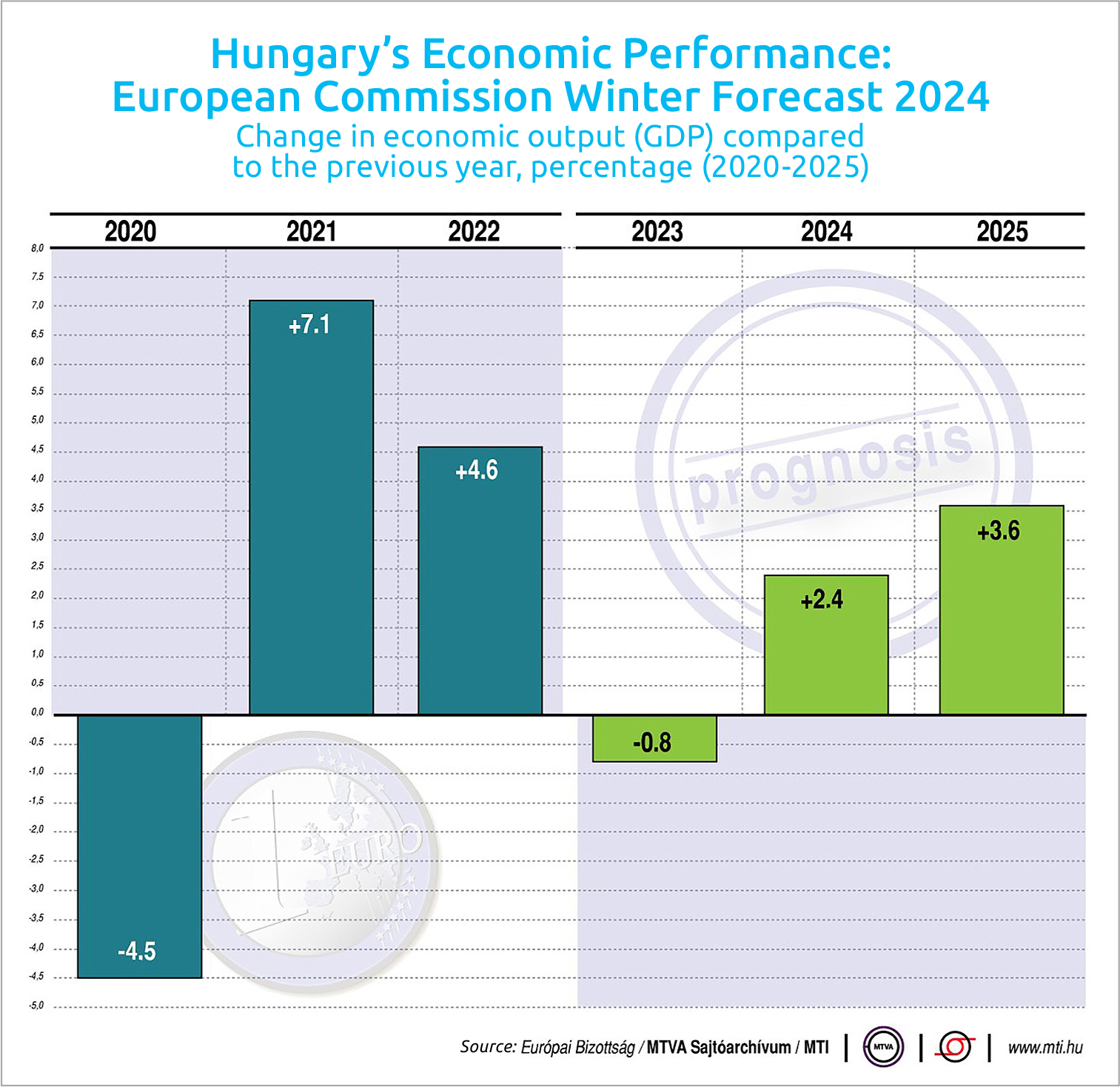Economy Suffers Unexpected Year-end Hiccups

In the fourth quarter of 2023, Hungary’s economic performance stagnated, having changed neither compared to the previous quarter nor Q4 2022. This was an unpleasant surprise, as the growth of the economy, which had only recovered from the recession in Q3 2023, stopped almost immediately.
Due to the weak performance in the last quarter, the annual average gross domestic product decline in 2023 was slightly more significant than expected. Hungary’s GDP was unchanged according to raw data, although it increased by 0.4% according to seasonally and calendar-adjusted and reconciled data in the fourth quarter of 2023 compared to the corresponding period of the previous year.
Compared to Q3 2023, the economic performance was unchanged, too, according to seasonally and calendar-adjusted and reconciled data, the latest figures issued by the Central Statistical Office (KSH) reveal.
Compared to Q4 2022, economic performance rose mostly in certain agricultural sections, human health and social work activities, and information and communication. Falls in industry, construction and some market services, mainly wholesale and retail trade, offset the growth. According to raw data, gross domestic product was 0.9% lower in 2023 and 0.8% lower according to seasonally and calendar-adjusted and reconciled data than in the previous year.
Analysts had expected economic growth to continue in the last quarter of 2023, even if not with the momentum of the third quarter. In light of the fact that the consensus of forecasts projected an expansion of 0.4%, the Q4 data is even more disappointing.
It is worth recalling that the Hungarian economy slipped into recession in the second half of 2022 and emerged convincingly only in Q3 last year, producing 0.8% growth. The drop in real wages, slowdown in the industrial economy, and shrinking public and private investments all contributed to the economic downturn.
Agriculture Grows Recovery
Agriculture, which produced good crop results when compared against the base effect of the 2022 drought, played a big role in the recovery. After that, analysts expected to see some growth in the fourth quarter due to the gradual recovery. But that did not prove to be the case: due to the weak performance in the last quarter, the annual average GDP decline in 2023 was even slightly larger than expected. According to the raw figures, the contraction was 0.9% rather than the expected 0.7%; when adjusted, the figure was 0.8%.
A weaker performance had only been recorded three times in the past 27 years: during the financial crisis in 2009, the European debt crisis in 2012 and the coronavirus crisis in 2020.
Although the detailed structure of the fourth quarter GDP will only be published on March 5, it can be said that the weakness of industry had a negative impact on economic dynamics. However, analysts had trusted that the increase in real wages would finally boost consumption, which could offset the negative effect of industrial performance. But this did not happen after all, so consumption was probably not as dynamic as expected. It was not possible to expect good results from the investments in the first place.
The data published by the KSH on Hungarian GDP was much weaker than the analysts’ preliminary expectations, wrote ING analyst Péter Virovácz. He also drew attention to an interesting detail: KSH corrected the data of the previous quarters in such a way that the GDP did not stagnate from January to March to April to June but decreased by 0.1%, meaning we had not three but four negative quarters in a row. That has not happened since 1995, when they began calculating according to the current methodology, he says.
Such weak year-end data may also explain why the government is pushing growth-supporting measures so strongly, Virovácz thinks. This means that the deficit target could also be higher since it is calculated in proportion to GDP; if gross domestic product is smaller, the same deficit will be higher in percentage, he noted.
What of 2024?
With the weak fourth-quarter performance, the spillover effect into 2024 will also be much less robust than desired: to achieve the 4% economic growth that the government hopes for, robust quarterly growth would have to be achieved throughout 2024.
ING’s forecast is fundamentally more pessimistic than the government’s; the bank expected GDP growth of 3% in 2024, but now even this is in danger “seeing the economic performance at the end of last year, so we clearly identify downside risks to the growth prospects,” wrote Virovácz.
While the GDP data was a negative surprise, the January inflation data provided more reasons to be optimistic. KSH reported that consumer prices were 3.8% higher on average in January 2024 than a year earlier. Compared to December, prices were up by 0.7% on average; however, clothing and footwear became 2.1% cheaper.
Since the second half of last year, significant disinflation has been detected in the economy. Inflation had already reached single digits in October. In December, prices increased by 5.5% compared to the previous year’s data. Analysts had forecast a figure of around 4% for January, so the 3.8% data was a positive surprise.
However, it is also important to note that the base effect is most visible in the first month of this year since the wave of inflation caused by the war and the energy crisis peaked exactly in January of last year at 25.7%.
This article was first published in the Budapest Business Journal print issue of February 23, 2024.
SUPPORT THE BUDAPEST BUSINESS JOURNAL
Producing journalism that is worthy of the name is a costly business. For 27 years, the publishers, editors and reporters of the Budapest Business Journal have striven to bring you business news that works, information that you can trust, that is factual, accurate and presented without fear or favor.
Newspaper organizations across the globe have struggled to find a business model that allows them to continue to excel, without compromising their ability to perform. Most recently, some have experimented with the idea of involving their most important stakeholders, their readers.
We would like to offer that same opportunity to our readers. We would like to invite you to help us deliver the quality business journalism you require. Hit our Support the BBJ button and you can choose the how much and how often you send us your contributions.










